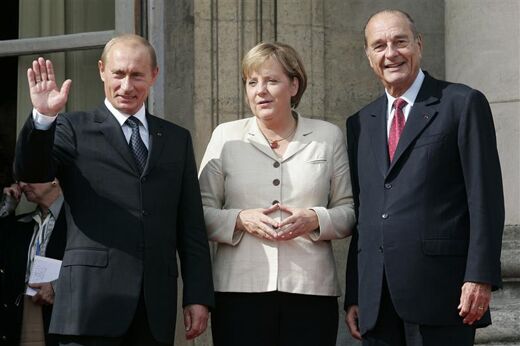
Russia Undermines Europe’s Energy Strategy
Russia is playing some high-stakes energy politics with Europe.
When Russia kicked off 2006 by temporarily shutting off the gas supply to Europe, European Union officials decided that the time to reduce dependency on Russian gas had arrived. One of the primary solutions the EU explored was to obtain more gas from Algeria, Europe’s second-largest gas supplier after Russia. In a paper published in June, an EU official observed, “If we manage to double gas imports from Algeria from 10 percent now to 20 percent in the future, the amount would be comparable to that of Russia.” This would provide a solution to the EU’s energy woes and sizably reduce the growing empire’s dependency on its seemingly unreliable Russian ally.
How did Russia respond to this plan? By making a deal with Algeria. In August, Gazprom—owned by the Russian state and the largest producer of natural gas in the world—announced it was forming a cooperation deal with the Algerian gas giant Sonatrach. The EU energy commissioner expressed concern that the deal could enable Russia and Algeria to “form some kind of cartel” and that “[d]efinitely we are worried about it.” Italian Foreign Minister Massimo d’Alema expressed concern that Gazprom and Sonatrach are “inextricably linked with their governments and thus they contribute to the realization of geopolitical strategies.”
EUobserver says the Kremlin is also “tightening its grip” in the South Caucasus and Central Asia, another area Brussels views as a possible supplier of energy.
Even aside from its manipulation of Europe, Russia’s activities in the energy sector are interesting. First, Russian President Vladimir Putin is using the energy sector to reestablish authoritarian control in Russia. Second, he is using that newly gained control to manipulate foreign energy companies. Moscow has recently withdrawn permits from foreign oil companies, including an environmental permit for the $20 billion Sakhalin-ii oil and natural gas development. Russian regulators have also threatened to cancel Total sa’s license to extract oil in the Arctic. Another company involved in a project on the Pacific island of Sakhalin, Exxon Mobil, was “denied permission to expand the boundary of its agreement to include additional reserves found in one of its fields” (Associated Press, September 20).
But if you stop to consider recent behavior exclusively in regards to Europe, Russia’s actions become especially fascinating. As his follow-up to the Algerian maneuver, President Putin directed a Russian bank to purchase a 5-percent stake in eads, the parent company to Airbus; the shares were purchased quietly until it reached the level where the state-owned Russian bank Vneshtorgbank had to announce its holding to the company. This puts EU officials in the unenviable position of having to decide whether or not to give Russia a seat on the board of eads. This company, which not only supplies European armies but is also seeking to become a key supplier for the Pentagon, will not want to be represented by a country that supports Iran and Syria.
Now forced to sit down at the table with Putin because of the Russian stake in Airbus, German Chancellor Angela Merkel and French President Jacques Chirac find themselves at Russia’s mercy energy-wise. Citing Merkel as the source of his idea, Putin announced that Russia may increase the supply of gas “from its giant Shtokman field in the Barents Sea to Europe, in addition to U.S. markets.” He also promised not to cut off existing routes and to honor all existing energy commitments.
There will be no EU reduction in dependency on Russia this week. Putin, while controlling the spigot, is maintaining—if not forcing—an energy alliance with Germany.
For now, the desperate need of gas forces the EU to ally itself with Russia. In turn, Russia wants EU money and whatever political support it can garner. But the more the Kremlin takes actions that startle Europe, the more urgent the effort to find alternate supplies will grow.
This actually serves as a catalyst to a more united, cohesive Europe—one that will not stand for geopolitical manipulation from Moscow. For more information on how this alliance will end, read our booklet Russia and China in Prophecy.
